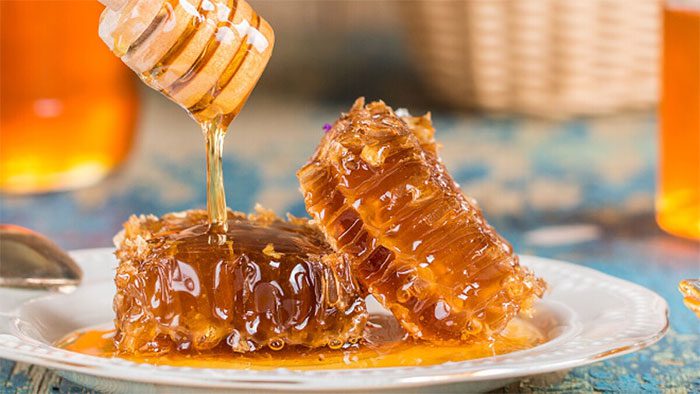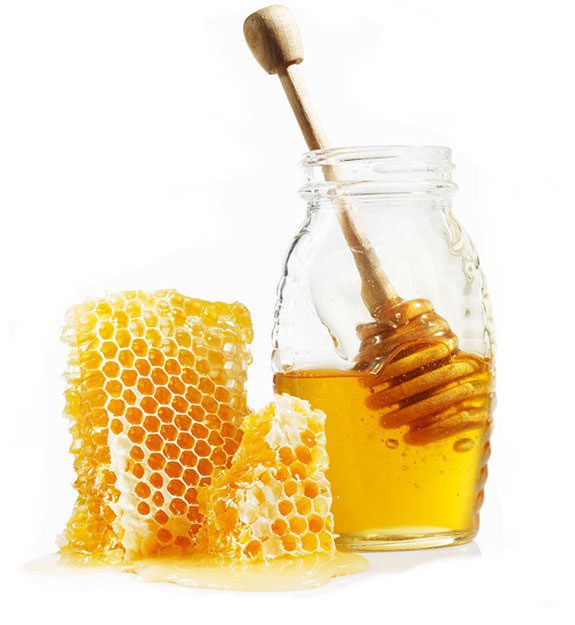Honey is a versatile food that can be used in many dishes and is also considered a remedy.
What You Need to Know When Using Honey
Honey is very nutrient-dense. In one tablespoon of honey (21 grams), there are 63.8 calories; 0 grams of fat; 17.3 grams of carbohydrates; 8.6 grams of fructose; 7.5 grams of glucose; 0.2 grams of sucrose; less than 0.5 grams of fiber; and 0.5 grams of protein.
Additionally, honey contains many antioxidants that are particularly beneficial to the body. However, improper use of honey can also lead to certain adverse effects. Below are 6 benefits and 3 potential risks associated with honey that everyone should be aware of.

Honey can effectively relieve cough and sore throat symptoms in children better than cough suppressants.
6 Health Benefits of Honey
1. Honey has antibacterial properties
According to Mary Sabat, an American nutrition expert: “Honey has been found to have antibacterial properties. This means it can help the body fight against bacteria, fungi, and viruses.”
The expert further stated: “According to a study published in the British Journal of Surgery, honey has even been found to be effective in helping to treat infected wounds.”
2. Honey is rich in antioxidants
Another benefit of incorporating honey into your diet is that it contains powerful antioxidants.
Nutrition expert Sabat says: “Honey is a rich source of antioxidants, which help protect the body from the harmful effects of free radicals—unstable molecules that can damage cells and contribute to chronic diseases such as cancer, heart disease, and Alzheimer’s.”
According to a study published in the journal Oxidative Medicine and Cellular Longevity, the antioxidant properties of honey are also linked to a reduction in chronic inflammation.
3. Honey soothes sore throats
Nutritionist Sabat notes: “Honey has been proven to be an effective remedy for sore throats.”
According to a study published in the Archives of Pediatrics and Adolescent Medicine, honey has been found to help reduce cough and sore throat symptoms in children more effectively than cough suppressants.
4. Honey is good for digestion
Honey can help improve digestive and intestinal health. “Honey has been shown to support digestion by promoting the growth of beneficial bacteria in the gut.”
A study published in the journal Frontiers in Nutrition indicates that honey contains prebiotics that are beneficial for gut health,” says nutrition expert Sabat.

Honey can cause allergies in some people.
5. Honey helps lower blood pressure
Several studies provide evidence that honey is beneficial for cardiovascular health. According to a study in The International Journal of Environmental Research and Public Health, honey may help improve heart rate, regulate blood fat levels, and protect healthy cells in the body.
Another study published in Clinical and Experimental Hypertension found that consuming a moderate amount of honey is associated with lowering blood pressure in women over 40 years old.
6. Honey does not significantly raise blood sugar levels
Using natural sweeteners as a substitute for regular sugar can be a healthier choice, especially for those needing to control blood sugar levels.
According to Jesse Feder, an American nutritionist and personal trainer: “Honey has been shown to help manage diabetes, along with medications for the condition. Specifically, studies have found that due to honey’s higher fructose content, consumption does not raise blood sugar levels as much as other sugars. In fact, honey may even enhance insulin activity, helping improve blood sugar levels.”
3 Potential Risks of Consuming Honey
1. Excess calories
Honey contains a relatively high amount of calories. Although honey is a natural sweetener, one tablespoon contains nearly 17 grams of sugar. As mentioned above, the sugar in honey may not raise blood sugar levels as much as other types of sugars. However, it is advisable to consume honey in moderation to avoid “more harm than good.”
2. Risk of allergies
The Mayo Clinic warns that some people may experience allergies when consuming honey. Nutrition expert Sabat states: “Some individuals may have allergic reactions to honey, with symptoms such as hives, itching, or swelling. In severe cases, an allergic reaction can lead to anaphylaxis. This is a dangerous situation that can threaten life and requires immediate medical attention.”
3. Risk of botulism in infants
The last thing to know about the potential risks of consuming honey is that it can be dangerous for children under one year old.
“Honey contains Clostridium botulinum spores that can cause botulism. These spores can germinate and produce toxins in the intestines of infants, leading to serious illness or even death,” emphasizes nutrition expert Sabat.



















































